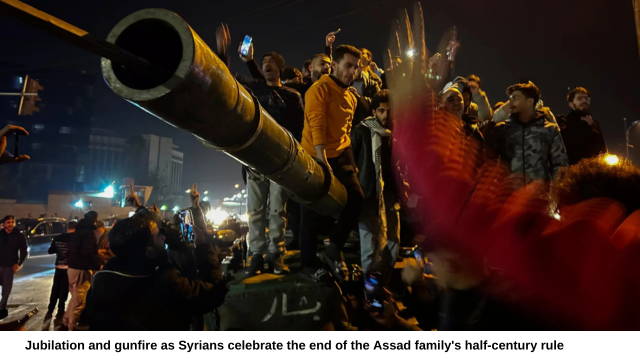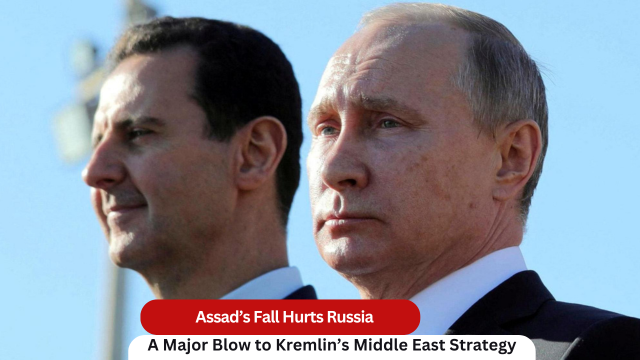For nearly a decade, Bashar al-Assad’s grip on power in Syria was fortified by Russian military intervention. Moscow’s firepower helped Assad weather the storm of civil war, asserting Russia’s influence in the Middle East. But the extraordinary developments of the last 24 hours have dealt a significant blow to Russia’s prestige, unraveling years of strategic investment. Assad’s fall, marked by his reported flight to Moscow, raises pressing questions about the future of Russian interests in the region.
Russia’s Strategic Gamble in Syria Ends in Disarray
Moscow’s intervention in Syria began in 2015, with the Kremlin deploying thousands of troops to prop up the Assad regime. This initiative was Russia’s first significant challenge to Western dominance beyond the former Soviet sphere. At the time, it appeared to be a masterstroke in global geopolitics. By 2017, President Vladimir Putin proudly declared “mission accomplished” during a visit to Russia’s Hmeimim airbase in Syria.
However, the sudden collapse of Assad’s regime and his escape to Moscow have turned this success into a setback. Russian state media confirmed that Assad and his family were granted asylum “on humanitarian grounds,” signaling the Kremlin’s inability to prevent the toppling of its staunchest Middle Eastern ally.
Assad’s Fall Hurts Russia: A Blow to Prestige and Strategy
The Loss of a Geopolitical Stronghold
Russia’s military intervention in Syria was about more than preserving Assad’s presidency. It was a calculated move to secure a long-term foothold in the Eastern Mediterranean. In return for its support, Russia obtained 49-year leases on critical military installations: the Hmeimim airbase and the Tartous naval base. These bases became hubs for Russia’s strategic operations, not only in Syria but also across Africa.
Now, the future of these bases is uncertain. Russian officials claim they are in contact with Syrian opposition leaders to ensure the security of these installations, but the loss of Assad’s regime is a significant blow to Moscow’s strategic ambitions.
The Impact on Russia’s Global Standing
The fall of Assad has global repercussions for Russia’s foreign policy. For years, Assad’s survival symbolized Moscow’s resurgence as a global power capable of influencing conflicts far beyond its borders. By supporting Assad, Russia demonstrated its ability to challenge Western interventions and shape the Middle East’s political landscape.
However, the unraveling of the Kremlin’s Syria project undermines this narrative. It highlights vulnerabilities in Russia’s strategy and raises doubts about its ability to maintain influence in volatile regions.
Assad’s Fall Hurts Russia: Domestic and International Reactions
Kremlin’s Attempt to Manage the Fallout
The Russian government has been quick to downplay the implications of Assad’s fall. State media, while acknowledging the gravity of the situation, has shifted the focus to internal issues, including Russia’s ongoing “Special Military Operation” in Ukraine. Anchors on flagship news programs have also sought to shift blame to the Syrian army, criticizing its inability to hold territory and fight back against rebel forces.
Despite these efforts, it is clear that Assad’s departure has left a vacuum in Moscow’s Middle East policy, one that the Kremlin may struggle to fill.

International Implications for Russian Influence
Assad’s downfall also exposes a broader challenge for Russia: maintaining its influence in a region fraught with competing interests. The loss of Syria as a reliable ally weakens Russia’s position in the Middle East and complicates its relationships with other regional powers, such as Iran and Turkey.
The situation also raises questions about Russia’s credibility as a strategic partner. For countries considering deeper ties with Moscow, the inability to safeguard Assad’s regime could serve as a cautionary tale.
Lessons from a Decade of Russian Intervention
The Risks of Overreach
Russia’s decade-long involvement in Syria underscores the risks of overextending geopolitical ambitions. While Moscow achieved short-term victories, the sudden collapse of Assad’s regime reveals the fragility of its long-term strategy.
Experts argue that Assad’s fall is not just a regional setback but a broader lesson for Russia’s foreign policy. The Kremlin’s focus on projecting power has often come at the expense of addressing underlying vulnerabilities in its alliances.
Assad’s Fall Hurts Russia: What’s Next for Moscow?
With Assad out of power, Russia faces a critical juncture. The Kremlin must decide how to navigate its military and political presence in Syria moving forward. Ensuring the safety of its military bases and personnel is a priority, but the loss of Assad complicates this effort. Moreover, the need to recalibrate its strategy in the Middle East comes at a time when Russia is already stretched thin by other international commitments, particularly its war in Ukraine.
Conclusion: A Setback with Far-Reaching Implications
The fall of Bashar al-Assad represents a significant blow to Russia’s prestige and influence in the Middle East. After years of investing military, political, and financial resources into preserving Assad’s regime, Moscow now finds itself grappling with the consequences of his departure. “Assad’s Fall Hurts Russia” not only as a symbol of its geopolitical ambitions but also as a reminder of the challenges inherent in projecting power beyond its borders.
For the Kremlin, the focus now shifts to damage control. However, the loss of Assad marks a turning point in Russia’s Middle East strategy, with repercussions likely to resonate far beyond Syria.














































